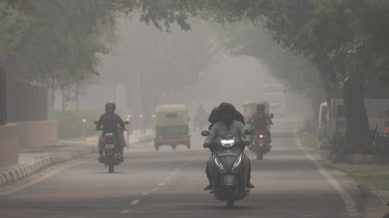Click here to join Express Pune WhatsApp channel and get a curated list of our stories
Pune to see moderate to poor air quality until tomorrow; doctors say Diwali ‘smoke’ a concern amid recovery from viral infections
While the warmer weather in Pune may offer some short-term atmospheric benefits, it is crucial to stay cautious during festivals like Diwali for those recovering from illness or with pre-existing conditions.

The air quality in Pune this Diwali is likely to be in the moderate category until Tuesday, according to a forecast by the System of Air Quality, Weather Forecasting and Research (SAFAR) at the Indian Institute of Tropical Meteorology (IITM).
Scientists said winds are currently strong, and air quality is expected to range from moderate to poor.
monthly limit of free stories.
with an Express account.
“Firecracker activity is likely to be spread out over both Monday and Tuesday, rather than being limited to a single day. Mornings are relatively mild and not very cold. Hence, ventilation is high, so pollutants are less likely to become trapped near the surface,” Dr Sachin Ghude, Project Director, SAFAR, IITM.
Dr Sundeep Salvi, Director, Pulmocare Research and Education (PURE) Foundation, explained that compared to previous years, the temperature this year is relatively warmer. “The current warm weather, combined with winds, can help reduce pollutant levels in the air. However, Pune has recently seen an outbreak of viral infections and many people are still in the recovery phase. Hence, exposure to pollution can delay or worsen their healing process,” Dr Salvi said.
While the warmer weather may offer some short-term atmospheric benefits, it is crucial to stay cautious during festivals like Diwali for those recovering from illness or with pre-existing conditions, doctors said, adding that Pune recently witnessed a viral outbreak and exposure to smoke from firecrackers can delay their healing process.
Smoke from firecrackers is especially harmful and is known to prolong upper respiratory tract infections. “Hence, it is important for those recovering from viral illnesses to take precautions. Wearing a mask can significantly reduce exposure to air pollutants and irritants. People with underlying conditions like COPD (Chronic Obstructive Pulmonary Disease) should be extra cautious, as their respiratory systems are more vulnerable,” Dr Salvi added.
Dr Dasmit Singh, paediatric surgeon at Sassoon General Hospital and Jehangir Hospital, said respiratory infections have been prevalent among children, with RSV [respiratory syncytial virus] being particularly widespread, leading to multiple ICU admissions. While the number of cases has declined, hospital admissions are still occurring. Children who are vulnerable to viral infections should continue to be protected.
According to chest physician Dr Nitin Abhyankar, each year the conversation about air pollution resurfaces around Diwali. “While it is important also to address the massive pre-Diwali crowds and excessive use of firecrackers, the issue runs deeper and calls for a shift in public mindset. Every day, our actions contribute to the carbon footprint, and it’s crucial that we make conscious efforts to reduce it,” Dr Abhyankar said.
Click here to join Express Pune WhatsApp channel and get a curated list of our stories